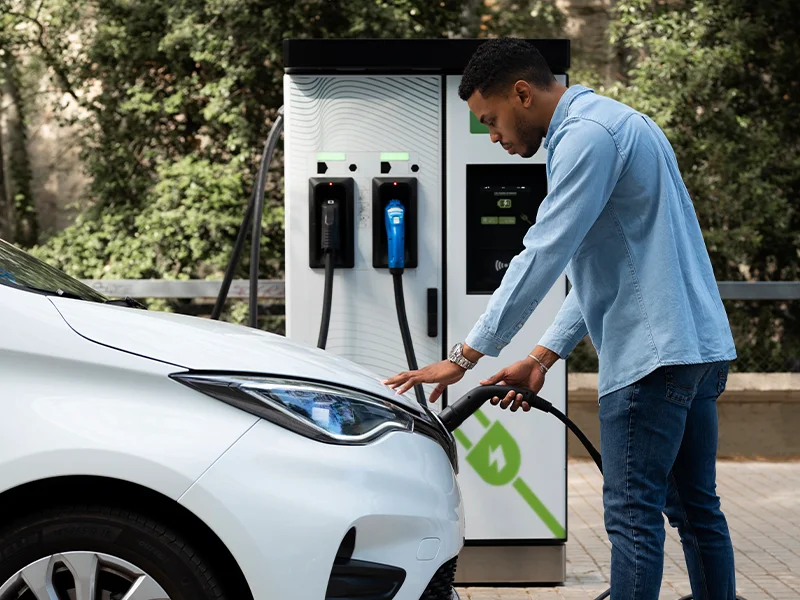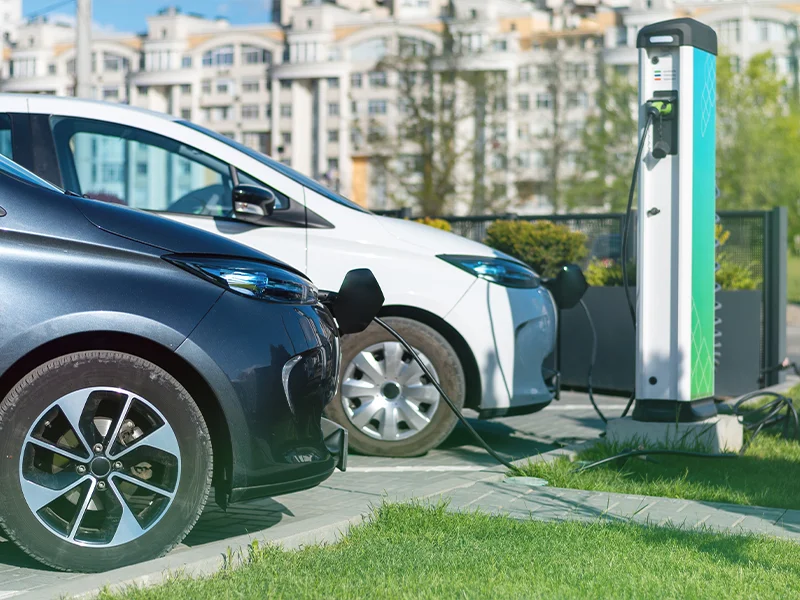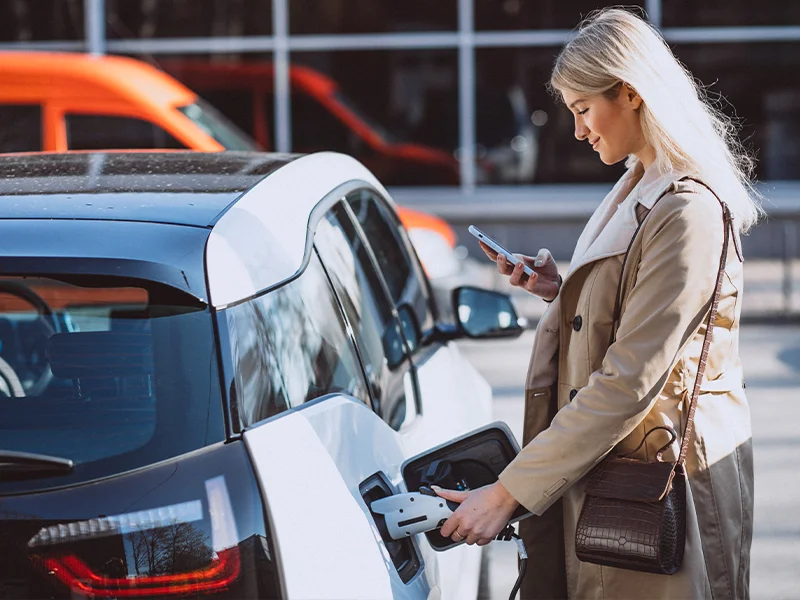You’ve chosen to drive an EV for a reason. You’ve selected the perfect EV to meet those needs. Now you have to choose a charging station that will serve your vehicle well.
In order to have an optimal EV experience, you should always be charging at a station that’s tailored to fit your vehicle type. As luxury EVs like Teslas become more common, many charging stations have been developed for that brand, but your vehicle may have completely different battery requirements.
Additionally, it’s important to choose a charging station that feels comfortable and convenient for you. Many charging stations offer certain amenities or services to make the experience easy, and are located in desirable areas so you never have to go far off your route to find one. This blog will go over the different factors that you should consider when choosing a charging station, some of which you may not be thinking about.
Types of EV Charging Stations
There are three main types of EV charging stations available, each with its own advantages and disadvantages. The type you select may depend on your vehicle, but also your route, current charge level, distance to go, and a number of other factors. You can read about each of the main types of charging stations below.
Level 1 Charging (120V AC)
Pros:
- Widely available plugs
- Low cost
- Suitable for overnight charging
Cons:
- Slow
- Limited for long trips
Level 2 Charging (240V AC)
Pros:
- Faster charging
- Versatile and available in many locations
Cons:
- Higher installation cost
- Not ideal for long-distance travel
- Limited for high-demand areas
DC Fast Charging (Direct Current)
Pros:
- Rapid charging
- Essential for long-distance travel
- Well-suited for busy locations
Cons:
- High installation costs
- Not typically used for home charging
- Potential battery degradation
The choice of EV charging station type depends on an individual’s specific needs and circumstances. Level 1 charging is suitable for daily use but lacks the speed needed for long trips. Level 2 charging offers a balance between charging speed and convenience and is commonly used in homes and public locations. DC fast charging is essential for rapid charging on the go but is more expensive and less common for residential use. As the EV infrastructure continues to develop, a combination of these charging types can provide the flexibility needed for various charging scenarios.
Location Matters
The location of a charging station is possibly the number one reason why you would seek out a specific station. If you’re on a long highway drive, for example, you probably want a station that’s not far off your route to save time.
Even charging stations that you use regularly should be in a convenient location. If a station is close to home, near local shopping or restaurants, or in a safe and highly populated area, that will make it a better experience for you each time you charge there.
With Charge Anywhere, you can find and filter between stations to find only those that work for you. While many charging stations of different types have their own apps where they can be located, Charge Anywhere puts them all on one map and allows you to select certain amenities that you want near your station, or even filter down to stations that are designed specifically for your vehicle type. The app can even calculate the most efficient route and guide you there. Charge Anywhere makes it easy to find a charging station that checks all your boxes.
Safety and Reliability
Depending on the speed of the charging station, it can take several hours to get your EV charged up and on the road again. The safety features available at and around a station can make or break your experience, as an unsafe location is one that you’re not likely to return to.
Particularly for solo female drivers, you should select a station in a well-populated area near other hubs of activity. While you’re waiting for your car to charge, it’s important that you feel comfortable whether you remain in the vehicle or get out and walk around.
Station reliability is also crucial to your comfort level. Each time you visit a station, you should have a similar experience, and you should know what to expect. Charging stations that regularly have technical difficulties, for example, are probably not stations you should be returning to again and again.
Charge Anywhere makes it easy to understand what different stations are like with our safety ratings. Users can leave reviews on any station they visit, allowing you to find or filter only the best stations that all people feel comfortable charging at. Safety is always of the utmost importance, but especially if you’re on a road trip or in a new area, you don’t always know what you’re getting into at certain locations. Charge Anywhere makes it easy to find out.
Amenities and Services at EV Charging Stations
Your charging experience can also be enhanced with nearby amenities and convenient services. Think about how nice it would be to enjoy free Wi-Fi and get work done, stream a show, or scroll social media while you wait for your car to charge.
Nearby shopping and dining is another great amenity to enjoy. You can plug in your car as you do weekly grocery shopping, run errands, or grab lunch with friends, and do it all in one place. Simply waiting for your car to charge can feel like a frustrating, lengthy experience, but having something to do in the meantime boosts your experience overall.
Other possible amenities may include lounges, vacuums or air for tires, or technological advancements that make the experience of charging itself as smooth as possible. Charge Anywhere makes it easy to filter available stations by your selected amenities so you can get exactly what you want out of your charging station.
Charging Station Cost and Payment Options
Many stations use different payment methods or structures, and a certain type may work better for you than others. A certain brand of charging station may have their own membership card, for example, that you can pay with for your convenience. But an unexpectedly different pricing model at a charging station can easily throw off your experience with it. Different cost factors you can expect to see are:
- Charging Rate and Speed: Different charging stations offer varying charging rates. Some are slower (Level 1), while others are faster (Level 2 or DC fast charging). Faster charging typically comes at a higher cost per unit of energy (e.g., per kWh).
- Pricing Structure: Charging stations may use different pricing structures, such as pay-per-use (per kWh), time-based charging, membership/subscription fees, or flat fees for access.
- Access Fees: Some charging networks or stations may require membership or access fees. These fees can be annual, monthly, or per-session charges.
- Idle Fees: Certain charging stations impose idle fees to encourage users to free up the charging spot once their vehicle is fully charged.
- Energy Pricing: Electricity rates can vary significantly by location, time of day, and utility providers. EV drivers should be aware of the energy pricing in the area where they plan to charge, especially if they are using a pay-per-use model that charges based on the electricity consumed.
- Charger Location: The location of the charging station can affect the overall cost. Stations located in premium areas, such as airports or downtown districts, may charge higher fees due to increased demand. On the other hand, more remote locations may offer lower pricing.
- Network Fees: If using a charging network or third-party charging app to locate and access stations, drivers should check for any associated fees or subscription costs.
- Credit Card Processing Fees: Some stations may charge extra fees for using credit cards or specific payment methods.
- Parking Fees: At certain charging stations, especially those located in parking garages or lots, drivers may need to pay parking fees in addition to charging costs.
To make informed decisions about where and how to charge their EVs, drivers should carefully assess these cost factors in relation to their charging habits, travel patterns, and budget constraints.
Charge Anywhere can help you identify the most cost-effective charging options for your specific circumstances. It offers in-app payment for all Charge Anywhere partner stations, no matter what type they are. Instead of fumbling with different apps or payment methods, Charge Anywhere makes it easy to simply pull up and pay.
Intelligent Route Mapping with Charge Anywhere
Intelligent route mapping is a personalized, real-time method of routine drivers to charging stations. It takes into account data like traffic, distance, terrain, battery life, your needs and desired amenities, and more to route you to the best possible charging station. Here are some of the different things intelligent route mapping considers to find you a charging station that works for you:
- Real-Time Data: Sophisticated route mapping systems offer up-to-the-minute information on the whereabouts and accessibility of charging stations along a pre-planned journey. This real-time data is of immense value to EV drivers, empowering them to make well-informed decisions regarding when and where to charge.
- Incorporating Charging Stops: These systems seamlessly incorporate charging stops into the travel itinerary. By doing so, they ensure that drivers are well-informed about where they’ll recharge, the time required, and the impact on their trip.
- Automatic Recommendations: Intelligent route mapping can suggest charging stops based on the EV’s current battery status, the planned route, and station availability.
- Range Confidence: By providing precise estimates of range and guidance on when and where to charge, these systems instill a sense of confidence in drivers..
- Convenience-Centric Planning: Intelligent route mapping assists drivers in selecting charging stations strategically located in convenient areas, such as near restaurants, shopping centers, or attractions.
- Comprehensive Mapping: Unlike the fragmented approach where various EV manufacturers or charging stations recommend different apps to consumers, Charge Anywhere consolidates all this information in one place.
Intelligent route mapping substantially simplifies the EV ownership and operation experience for drivers by making charging an easy experience that doesn’t require any research or routing from you. Simply focus on driving.
User Reviews and Ratings
Lastly and perhaps most crucial to some are the reviews and ratings of different charging stations. Just as you would check the reviews of a restaurant before you arrive, you should check the same for charging stations. Customers can leave safety ratings as well as general reviews about their experience at the station on Google or in the Charge Anywhere app.
Charge Anywhere provides real-time user feedback and allows you to find and filter stations based on their ratings. These reviews offer real-world insights into the reliability, accessibility, and overall user experience at specific charging locations. They can help you make an informed decision about where to charge and avoid potential issues or uncertainties. Positive reviews can boost confidence in a charging station, while negative feedback can highlight areas that need improvement, encouraging station operators to address issues promptly. Charging stations are being bettered and expanded all the time.
Conclusion
The charging station that you select depends entirely on what you’re looking for. Pricing, location, safety rating, compatibility with your vehicle, and convenience are all reasons why you might seek out a specific kind of station.
By downloading the Charge Anywhere app, EV drivers can find the best charging stations tailored to their needs with our personalized filtering features. It can be downloaded on the Apple App Store or Google Play. Signing up is quick and easy, and gives you access to all of Charge Anywhere’s station partners.
FAQs
Can all EVs use the same charging stations?
No. You may be able to use certain charging stations that are not perfectly compatible with your EV, but it’s possible that there are associated fees. It’s generally recommended to always use a charging station that is designed for your vehicle type.
What is the difference between a 40 amp and 48 amp EV charger?
The main difference between a 40-amp and a 48-amp EV charger is their charging capacity. A 48-amp charger can supply more electricity to an electric vehicle, allowing for faster charging compared to a 40-amp charger.




